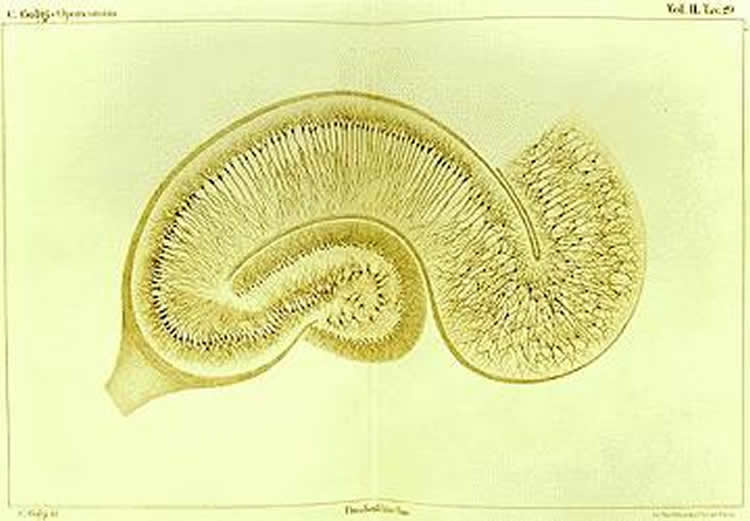Summary: Researchers report the hippocampus isn’t just important for remembering past events, it also plays a vital role in future planning.
Source: Boston University Medical Center.
Over the past decade, researchers have learned that the hippocampus–historically known for its role in forming memories–is involved in much more than just remembering the past; it plays an important role in imagining events in the future. Yet, scientists still do not know precisely how the hippocampus contributes to episodic imagining–until now. Researchers from Boston University School of Medicine (BUSM) have determined the role of the hippocampus in future imaging lies in the process of constructing a scene in one’s mind.
The findings, which appear in the journal Cerebral Cortex, shed important light on how the brain supports the capacity to imagine the future and pinpoints the brain regions that provide the critical ingredients for performing this feat.
The hippocampus is affected by many neurological conditions and diseases and it also can be compromised during normal aging. Future thinking is a cognitive ability that is relevant to all humans. It is needed to plan for what lies ahead, whether to navigate daily life or to make decisions for major milestones further in the future.
Using functional Magnetic Resonance Imaging, BUSM researchers performed brain scans on healthy adults while they were imagining events. They then compared brain activity in the hippocampus when participants answered questions pertaining to the present or the future. After that, they compared brain activity when participants answered questions about the future that did or did not require imagining a scene. “We observed no differences in hippocampal activity when we compared present versus future imaging, but we did observe stronger activity in the hippocampus when participants imagined a scene compared to when they did not, suggesting a role for the hippocampus in scene construction but not mental time travel,” explained corresponding author Daniela Palombo, PhD, postdoctoral fellow in the memory Disorders Research Center at BUSM and at the VA Boston Healthcare System.

According to the researchers the importance of studying how the hippocampus contributes to cognitive abilities is bolstered by the ubiquity of hippocampal involvement in many conditions. “These findings help provide better understanding of the role of the hippocampus in future thinking in the normal brain, and may eventually help us better understand the nature of cognitive loss in individuals with compromised hippocampal function,” she added.
Palombo believes that once knowledge about which aspects of future imagining are and are not dependent on the hippocampus, targeted rehabilitation strategies can be designed that exploit those functions that survive hippocampal dysfunction and may provide alternate routes to engage in future thinking.
Funding: Funding for this study was provided by the National Institutes of Mental Health (grant number H093431) and the Department of Veterans Affairs (Clinical Science Research and Development Service and Rehabilitation Research & Development Service grant number E7822W). Co-author D.J.P. was supported by a postdoctoral fellowship from the Canadian Institutes of Health Research (CIHR). This work was further supported with resources and the use of facilities at the Neuroimaging Research for Veterans Center, VA Boston Healthcare System.
Source: Gina DiGravio – Boston University Medical Center
Image Source: NeuroscienceNews.com image is in the public domain.
Original Research: Abstract for “Medial Temporal Lobe Contributions to Episodic Future Thinking: Scene Construction or Future Projection?” by D.J. Palombo, S.M. Hayes, K.M. Peterson, M.M. Keane, and M. Verfaellie in Cerebral Cortex. Published online December 1 2016 doi:10.1093/cercor/bhw381
[cbtabs][cbtab title=”MLA”]Boston University Medical Center “How the Hippocampus Influences Future Thinking.” NeuroscienceNews. NeuroscienceNews, 5 December 2016.
<https://neurosciencenews.com/future-thinking-hippocampus-5680/>.[/cbtab][cbtab title=”APA”]Boston University Medical Center (2016, December 5). How the Hippocampus Influences Future Thinking. NeuroscienceNew. Retrieved December 5, 2016 from https://neurosciencenews.com/future-thinking-hippocampus-5680/[/cbtab][cbtab title=”Chicago”]Boston University Medical Center “How the Hippocampus Influences Future Thinking.” https://neurosciencenews.com/future-thinking-hippocampus-5680/ (accessed December 5, 2016).[/cbtab][/cbtabs]
Abstract
Medial Temporal Lobe Contributions to Episodic Future Thinking: Scene Construction or Future Projection?
Previous research has shown that the medial temporal lobes (MTL) are more strongly engaged when individuals think about the future than about the present, leading to the suggestion that future projection drives MTL engagement. However, future thinking tasks often involve scene processing, leaving open the alternative possibility that scene-construction demands, rather than future projection, are responsible for the MTL differences observed in prior work. This study explores this alternative account. Using functional magnetic resonance imaging, we directly contrasted MTL activity in 1) high scene-construction and low scene-construction imagination conditions matched in future thinking demands and 2) future-oriented and present-oriented imagination conditions matched in scene-construction demands. Consistent with the alternative account, the MTL was more active for the high versus low scene-construction condition. By contrast, MTL differences were not observed when comparing the future versus present conditions. Moreover, the magnitude of MTL activation was associated with the extent to which participants imagined a scene but was not associated with the extent to which participants thought about the future. These findings help disambiguate which component processes of imagination specifically involve the MTL.
“Medial Temporal Lobe Contributions to Episodic Future Thinking: Scene Construction or Future Projection?” by D.J. Palombo, S.M. Hayes, K.M. Peterson, M.M. Keane, and M. Verfaellie in Cerebral Cortex. Published online December 1 2016 doi:10.1093/cercor/bhw381






